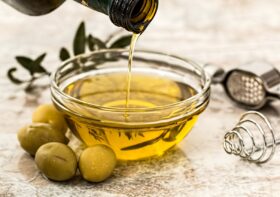Does Sugar Cause Acne?

When we think of sugar, we often think about white table sugar that is used to bake with, but there are many things that actually fall under the umbrella term of “sugar”. There are actually three types of carbohydrates: simple sugar, starch, and fiber. Simple sugars and starch ultimately break down into glucose, a type of sugar used in the body for energy. Does this sugar cause acne? If so, what do we do about it?
When we eat foods containing carbohydrates, it’s the body’s goal to break these foods down into glucose, the single sugar molecule our bodies use for energy and organ function. But, in order to actually get glucose into our cells, the body must produce a hormone called insulin. Insulin binds to our cells and allows glucose to enter and and be used effectively.
Carbohydrates are a natural and healthy part of an overall diet. They’re found in plenty of nutritious foods like fruits, vegetables, whole grains, beans, etc. But, they are also found in table sugar, snack foods (chips, crackers, granola bars, etc.), breads, baked goods, soda, candy, and other processed foods.
The latter form of carbohydrates are known as refined carbohydrates, which means they’ve been broken down prior to consumption. Refined carbohydrates includes both refined starches and sugars. The refining process makes it very easy for our bodies to break these down into glucose. This then causes an unnatural influx of glucose, which leads to high insulin production.
How refined carbohydrates can increase acne development
Insulin makes androgen hormones more active and increases insulin-like growth factor 1 (IGF-1). This contributes to acne development by making skin cells grow more quickly and by boosting sebum production.
On the other hand, low-glycemic diets, which do not dramatically raise blood sugars or insulin levels, are associated with reduced acne severity (1).
In fact, one study found that those who ate added sugars more often had a 30% increased risk of developing acne, and those who consumed pastries and cakes on a regular basis had a 20% increased risk (2).
Additionally, excess sugar consumption has also been linked to inflammation due to elevated insulin levels. Inflammation may also be associated with acne development.
Refined carbohydrates also feed the unfriendly bacteria in our gut microbiome. Research shows that gastrointestinal health and dysfunction can affect acne pathophysiology through the gut mircrobiota (including gut dysbiosis, such as in small intestinal bacterial overgrowth) and the gut-brain-skin axis (3).
What’s more, traditional cultures whose diets consist of low-glycemic index foods and avoid those that are refined or processed rarely have issues with acne (1, 3, 4).

So what can we do? Do we have to completely avoid all refined carbohydrates?
In the short term? Maybe. It may help heal hormonal acne more quickly as blood sugars and insulin levels stabilize. In the long-run though, no. Simply limiting the overall amount can likely make a big impact. This means enjoying refined carbohydrates occasionally and in small quantities, rather than on a regular basis or in large quantities.
Consuming fiber-rich foods will aid blood-sugar regulation as well since fiber slows absorption of carbohydrates in the digestive track, preventing drastic spikes in blood sugar, and thus, insulin.
Fiber may also help clear hormonal acne by increasing regularity as well as limit risk of developing gut dysbiosis. Fiber helps prevent constipation, which can contribute to small intestinal bacterial overgrowth. It also feeds the friendly gut bacteria in our microbiome, resulting in a healthier gastrointestinal tract.
Carbohydrate-rich foods to limit: refined carbohydrates & added sugars
- White bread and pasta
- Crackers, cereal, and desserts make with white flour and/or refined sugar
- Soda and other sugar-sweetened beverages (the average 20 oz soda has 16 teaspoons of sugar!)
- Candy and added sugars (cane sugar, maple syrup, honey, etc.)
Carbohydrate-containing foods to include most often: whole, fibrous fruits, vegetables, and grains
- Fruits (berries, apples, peaches, oranges, etc.)
- Vegetables (broccoli, asparagus, brussels sprouts, green beans, beets, carrots, etc.)
- Whole grains & starchy vegetables (potatoes & sweet potatoes, winter squashes, corn, peas, oats, brown rice, etc.)
- Beans & legumes (chickpeas, lentils, black beans, etc.)
Even fiber-rich carbohydrates should ideally be combined with fats and proteins to further prevent blood sugar swings, and therefore, lessen the risk of hormonal acne development. For example, an apple is going to be a better option for blood sugar than apple juice or a cookie, but pairing that apple with peanut butter will be the best option versus eating it on it’s own.
Do you need more nutrition guidance for hormonal acne and blood sugar control? Work with me
Sources:
- Kubala, Jillian. The Best Diet and Supplements for Acne Vulgaris (Hormonal Acne). Healthline. July 24, 2019. https://www.healthline.com/nutrition/hormonal-acne-diet.
- Julson, Erica. Top 7 Foods That Can Cause Acne. Healthline. January 24, 2018. https://www.healthline.com/nutrition/foods-that-cause-acne.
- Salam, Iman; Ramser, Amy; Isham, Nancy; Ghannoum, Mahamoud A. The Gut Microbiome as a Major Regulator of the Gut-Skin Axis. Front Microbiol. 2018; 9: 1459. Published online 2018 Jul 10. doi: 10.3389/fmicb.2018.01459.
- Baldwin, Hillary; Tan, Jerry. Effects of Diet on Acne and It’s Response to Treatment. Am J Clin Dermatol. 2021; 22(1): 55–65. Published online 2020 Aug 3. doi: 10.1007/s40257-020-00542-y.




Leave a Reply